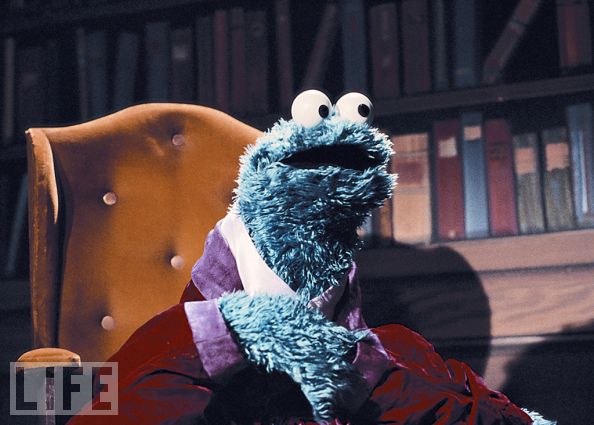In praise of Cookie Monster, the literary muppet

In De pueris instituendis (On the education of children, 1529), the great Renaissance humanist Erasmus, borrowing from the classical rhetoricians Horace and Quintillian, helped reintroduce an important idea:
I have now come to the stage of my argument where I shall briefly explain how love of study may be instilled in children - a subject which I have already touched upon in part. As I have said, through practice we acquire painlessly the ability to speak. The art of reading and writing comes next; this involves some tedium, which can be relieved, however, by an expert teacher who spices his instruction with pleasant inducements. One encounters children who toil and sweat endlessly before they can recognize and combine into words the letters of the alphabet and learn even the bare rudiments of grammar, yet who can readily grasp the higher forms of knowledge. As the ancients have demonstrated, there are artful means to overcome this slowness. Teachers of antiquity, for instance, would bake cookies of the sort that children like into the shape of letters, so that their pupils might, so to speak, hungrily eat their letters; for any student who could correctly identify a letter would be rewarded with it.
In grad school, I worked with a British literary historian who expertly broke this down into a post-psychoanalytic framework. Biscuits, like speech and writing, form a circuit between the eyes, hand, and mouth. The regulation of desire clears the way for the discipline of discourse. Like Plato, we move from the immanent and particular to the abstract and universal, but this is always mediated by the body, whose conflicting drives trouble these ideal categories.
I responded: “It’s Cookie Monster.” Growing up in England, he’d never heard of him.
Cookie’s idiosyncratic pronouns and truncated consonant clusters are a ruse. He’s easily the most verbally adept, best-educated character on Sesame Street. He teaches children the alphabet and vocabulary, and of course doubles as Alistaire Cookie on Monsterpiece Theatre. The growly voice, googly eyes, and outsized yearnings mask the heart of a scholar.
I bet he used to be a graduate student. You can’t show any of us free food without us reacting like this.

He even loves absurdist metafiction:
Cookie is all of us who always get underestimated, just because we refused to always change how we talk and how we act because we went to school. But we love those sweet leatherbound books, too.
NOTE: Cookie Monster was invited and was originally slated to collaborate on this post. He was excited; I was excited. Unfortunately, due to a scheduling conflict, he wasn’t able to appear. You have his and my regrets. (I swear on Mr. Snuffleupagus: All of this is 100 percent true.)





Stay Connected